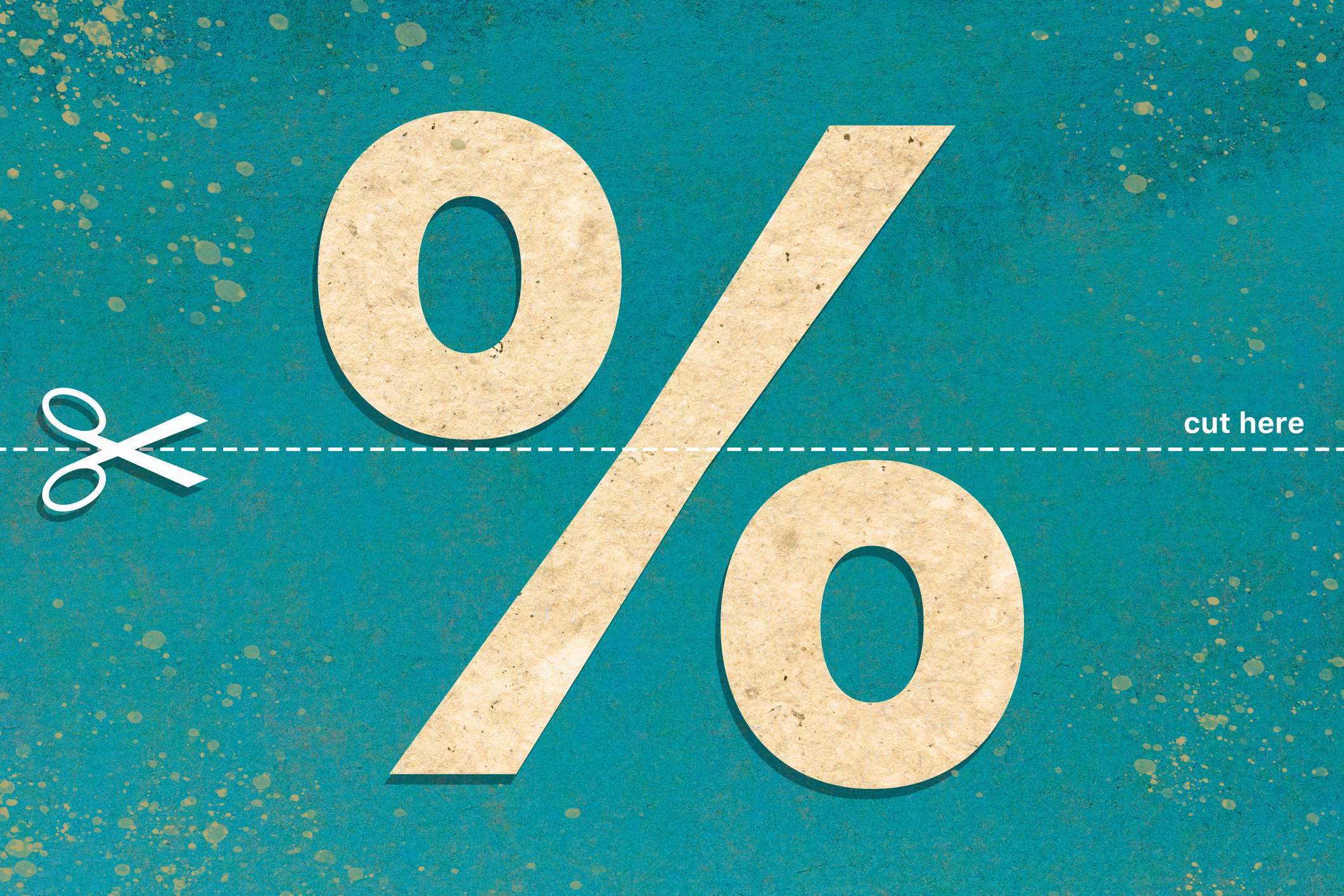The Only Two Vanguard Index Funds You Need for Retirement
Investing doesn't need to be complicated or expensive. Build a dirt-cheap portfolio that can last a lifetime with just one stock ETF and one bond ETF.


Profit and prosper with the best of Kiplinger's advice on investing, taxes, retirement, personal finance and much more. Delivered daily. Enter your email in the box and click Sign Me Up.
You are now subscribed
Your newsletter sign-up was successful
Want to add more newsletters?
Every year or so, I pen a column about how to invest for the long haul using just a handful of Vanguard index funds (read the latest version: "6 Best Vanguard Index Funds for 2018 and Beyond"). Without fail, this article is more popular than anything else I write for Kiplinger.com. Plainly, keeping investing simple is a goal of many investors. Unlike me, most folks don't relish the prospect of spending endless hours researching funds.
So, I got to thinking: How many Vanguard index funds do you really need to be a successful investor? My conclusion: You can do a terrific job with just two. This article takes a deeper dive into both of these Vanguard index funds. What's more, it tells you how to adjust your investment allocation as you approach and live in retirement.
The only stock index fund you'll ever need
The key fund is Vanguard Total World Stock ETF (symbol VT), an exchange-traded fund that invests in both U.S. and foreign stocks. Note that a traditional mutual fund version of the same fund, Vanguard Total World Stock Index (VTWSX), is equally good, except the investor shares of the mutual fund are more expensive—a 0.21% fee versus 0.11% for the ETF. Stocks with large market capitalizations dominate the fund. But 18% of assets are currently in mid-cap stocks and 6% in small-cap stocks. Eight percent of assets are in emerging markets.
From just $107.88 $24.99 for Kiplinger Personal Finance
Become a smarter, better informed investor. Subscribe from just $107.88 $24.99, plus get up to 4 Special Issues

Sign up for Kiplinger’s Free Newsletters
Profit and prosper with the best of expert advice on investing, taxes, retirement, personal finance and more - straight to your e-mail.
Profit and prosper with the best of expert advice - straight to your e-mail.
Vanguard Total World Stock tracks the FTSE Global All-Cap Index, which, in turn, covers practically every stock in the world, except for the tiniest ones. The fund invests in 7,900 stocks—compared to the 100 or 200 stocks found in most funds. Largest holdings are Apple (AAPL), Microsoft (MSFT), Amazon.com (AMZN), Facebook (FB) and Johnson & Johnson (JNJ). The largest foreign holdings are Chinese Internet company Tencent Holdings Ltd. (TCEHY) and Switzerland-based food giant Nestle (NSRGY).
The ETF is Vanguard cheap. On an investment of $10,000, the 0.11% expense ratio works out to a mere $11 a year. Further holding down costs, the fund trades infrequently. On average, expect a stock to stay in the fund 10 years.
Like conventional index mutual funds, the ETF weights stocks by their market cap—that is, share price times number of shares outstanding. Plenty of exchange-traded funds weight stocks differently, but it's worth considering the beauty of simple market-cap weighting. When you invest in Vanguard Total World Stock, you get the collective opinion of all investors worldwide about which stocks are likely to yield the highest returns with the least risk.
Currently, 52% of holdings are in U.S. stocks, 47% in foreign stocks and the rest in cash. Fifty-six percent of assets are in the U.S. and Canada, 22% in Europe, and 21% in Asia.
Some experts, most notably Vanguard founder Jack Bogle, question the need for investing overseas given that a big slug of U.S. corporate profits come from foreign countries. But history shows that foreign and domestic stocks typically take turns leading each other for multi-year periods. Foreign stocks have been winning over the past year or so after a particularly lengthy bad patch. If, however, you feel the fund provides too much foreign exposure, just subtract 10% or 20% from Total World Stock and invest it in its all-domestic sibling, Vanguard Total Stock Market ETF (VTI).
Owning both foreign and domestic stocks reduces the overall volatility of the fund. Total World Stock is about as volatile as Standard & Poor's 500-stock index but about 20% less volatile than the MSCI EAFE index of developed market stocks. Over the past five years through Jan. 18, Total World Stock has trailed the S&P 500 by an average of 4.6 percentage points per year, but it has beaten the EAFE index by 3.1 points.
The fund doesn't hedge against currency risk. Currencies can be volatile over the short term, but, in my view, investing in foreign currencies is part of investing in foreign stocks.
The only bond index fund you'll ever need
What about bonds? My pick is Vanguard Short-Term Corporate Bond ETF (VCSH). The fund yields 2.6% and charges annual expenses of just 0.07% annually. If interest rates rise by one percentage point, the fund's price should dip 2.8%—which would be more than made up for by fund's rising yield. Its average credit rating is single-A. The Admiral shares of the traditional mutual fund version, Vanguard Short-Term Corporate Bond Index (VSCSX), charge an identical 0.07%.
Interest rates are headed higher, albeit at a slow and gradual pace, which means longer-term bond funds may well lose money. And you're not getting paid enough in yield to make up for the risks of investing in junk bonds. Put 25% of your investments in Short-Term Corporate Bond.
The 75% stock/25% bond mix is a good one for investors 15 or more years from retirement. Remember to rebalance every year or so if the market's action gets your initial allocation out of whack. When you're within 15 years of retirement, trim your stock ETFs by five percentage points and add that cash to the bond ETF. Repeat that maneuver every five years or so, until you have about 60% in stocks and 40% in bonds, which is a good allocation for the early and middle years of retirement.
Steven Goldberg is an investment adviser in the Washington, D.C., area.
Profit and prosper with the best of Kiplinger's advice on investing, taxes, retirement, personal finance and much more. Delivered daily. Enter your email in the box and click Sign Me Up.

-
 Why Some Michigan Tax Refunds Are Taking Longer Than Usual This Year
Why Some Michigan Tax Refunds Are Taking Longer Than Usual This YearState Taxes If your Michigan tax refund hasn’t arrived, you’re not alone. Here’s what "pending manual review" means and how to verify your identity if needed.
-
 If You'd Put $1,000 Into Caterpillar Stock 20 Years Ago, Here's What You'd Have Today
If You'd Put $1,000 Into Caterpillar Stock 20 Years Ago, Here's What You'd Have TodayCaterpillar stock has been a remarkably resilient market beater for a very long time.
-
 Good Stock Picking Gives This Primecap Odyssey Fund a Lift
Good Stock Picking Gives This Primecap Odyssey Fund a LiftOutsize exposure to an outperforming tech stock and a pair of drugmakers have boosted recent returns for the Primecap Odyssey Growth Fund.
-
 More Tools to Build a Bond Ladder
More Tools to Build a Bond LadderVanguard aims to launch a line of target-maturity corporate bond ETFs.
-
 Vanguard Cuts Fund Fees Again. Here's Why That's Important for You
Vanguard Cuts Fund Fees Again. Here's Why That's Important for YouVanguard recently cut fees on dozens of ETFs and mutual funds, which is great news for investors. Here's why.
-
 Best Mutual Funds to Invest In for 2026
Best Mutual Funds to Invest In for 2026The best mutual funds will capitalize on new trends that emerge this year, all while offering low costs and solid management.
-
 Smart Ways to Invest Your Money This Year
Smart Ways to Invest Your Money This YearFollowing a red-hot run for the equities market, folks are looking for smart ways to invest this year. Stocks, bonds and CDs all have something to offer in 2024.
-
 Vanguard's New International Fund Targets Dividend Growth
Vanguard's New International Fund Targets Dividend GrowthInvestors may be skittish about buying international stocks, but this new Vanguard fund that targets stable dividend growers could ease their minds.
-
 Best 401(k) Investments: Where to Invest
Best 401(k) Investments: Where to InvestKnowing where to find the best 401(k) investments to put your money can be difficult. Here, we rank 10 of the largest retirement funds.
-
 7 Best Stocks to Gift Your Grandchildren
7 Best Stocks to Gift Your GrandchildrenThe best stocks to give your grandchildren have certain qualities in common. Here, we let you know what those are.
-
 How to Find the Best 401(k) Investments
How to Find the Best 401(k) InvestmentsMany folks are likely wondering how to find the best 401(k) investments after signing up for their company's retirement plan. Here's where to get started.